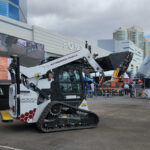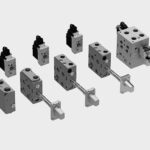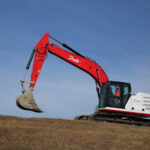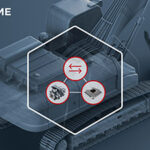As I noted in our mobile trends feature last month, the discussion around transitioning machinery to more efficient alternatives, particularly in embracing electric solutions has gained significant traction. This paradigm shift is not merely about the evolution of technology; it’s about redefining the very core of how construction machinery operates.

Digital hydraulics, especially when combined with electric systems, presents a unique opportunity to revolutionize efficiency.
The transition toward electric machinery initially leans towards smaller-sized equipment like mini excavators or tractors. The advantage here is that existing technology is more mature and adaptable for these smaller machines, making the shift relatively more feasible. Forklifts and scissor lifts have already made significant strides in this direction, with electric variants dominating the market. The emphasis on local electric options, particularly in urban settings, is an apparent trend given their reduced environmental impact compared to combustion engines.
Read on for a lightly edited transcript of my conversation with Domenico Traverso, President, Editron and Incubation Division, Danfoss, as he shares further thoughts from Danfoss on the future of electrified mobile machinery.
Fluid Power World: Can you talk about low voltage versus high voltage. Why are the low voltage machines the area that’s kind of happening right now and what applications are you targeting with those higher voltage designs from Editron?
Traverso: This really comes mostly from the size of the machine and the fact that the first machine that we see that is being electrified — because I think it’s easier, and it’s cheaper and so it’s more affordable for the OEMs — is a smaller machine. For instance, the mini excavator, the smaller tractor, you can make it electric. It’s easier with existing technology. It’s more mature, the low voltage. I think it’s more for things available almost off the shelf.
Think about in a city with a mini excavator. I think nowadays, we would all prefer to see electric rather than a combustion engine because it is really polluting. I think there is a trend where those machines are still limited but like for scissor lifts, forklift trucks, most of these are already electric. Next, the mini excavator is slowly coming; I think the number of electric machines is already in the thousands.
If you take a large machine, like a wheel loader or an excavator, to make it electric the technology is complicated. You require very expensive solutions. And the battery also is big and so is very expensive. The machine is going to cost much more than a normal combustion engine machine, which of course is also limiting adoption.
Also you need to be driven by regulation, right, so if there’s some cities that say, in this area, you can only work with electric machines, then you will have an electric wheel loader or electric excavator. If not, you are not incentivized, so you’ll use an internal combustion engine. We are not there yet. The production of electric wheel loaders is there in China, we see actually they’re growing. But it’s not a large volume.
Fluid Power World: I know that Editron works with fully electric and the hybrid systems. Do you see either those being more the future or will that be kind of machine dependent, whether it’s going to be more hybrid or fully electric?
Traverso: I think it is machine dependent and it is regulation dependent, also. There are cities that are moving in the direction either to highly incentivize or even to regulate using electric equipment in some areas. Bear in mind that the awareness with the big cities is that construction machinery are polluting as much as the aviation industry. So, in the past it was the focus on passenger cars in the cities. There was no ordinance that construction equipment as well was adding CO2 emissions as much commercial planes.
There are many cities all over the world studying and moving to regulate, sometimes incentivize the use of electric construction equipment. Now this can make a huge difference and that could shift the use of those wheel loaders or larger machines in a minute. Then you will be going with electric because there’s no choice or because you are incentivized so much. You pay more for the machine but then you get some benefit from the government.
Fluid Power World: Let’s talk more about the technical side of how putting Dextreme and Editron together can revolutionize efficiency.
Traverso: This is great because this goes on excavators specifically and excavators are responsible for 50% of emissions in the construction industry. An excavator is one of the most complicated machines to make electric. An electric excavator today is still running with hydraulics. An electric excavator is much more expensive than the normal combustion engine excavator, and the hydraulic system on an excavator is not super-efficient.
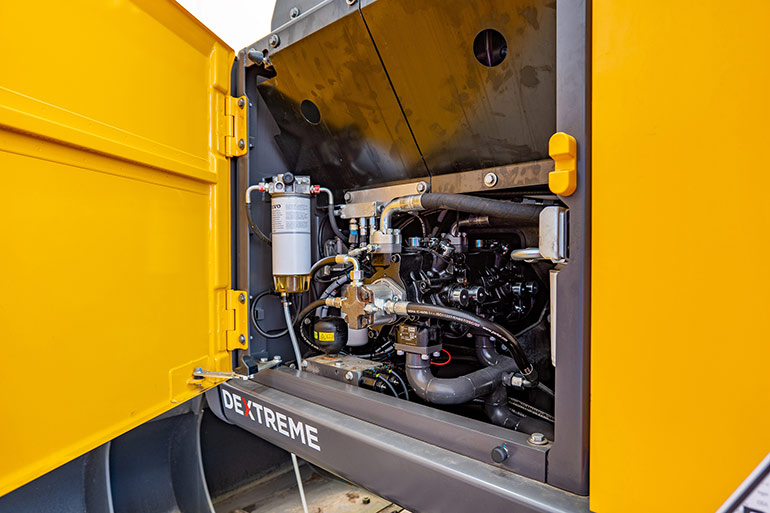
If you take it as is today without a digital pump, basically you have a massive battery and big engines and so the use of energy is much higher. But what happens if you can really improve the efficiency of the excavator by 50%. On a large excavator with Dextreme, you can improve up to 50%. That means really that the cost of the excavator itself is reduced. The battery is a massive cost on those machines. The battery can be smaller and the motors can be smarter, smaller and so on. Basically, you downscale all the equipment, you make it more affordable, and you make it last longer. The machine is still fundamentally a hydraulic machine; the arm of this excavator is still run by hydraulics. So in theory, I think Dextreme on a hydraulic excavator is a great innovation and will reduce emission by 30% or by 50%. If you use this solution on a normal combustion engine you reduce emissions, but if you do it on an electric one, you have a huge benefit.
Fluid Power World: Do you think that without these modernized digital type of hydraulics, that hydraulics could eventually be phased out of machinery, especially excavators? Do you think that electric actuation could replace it?
Traverso: I think it would take a long time. We’re still far from having a fully electric actuator that can run cost effectively on an excavator. I think it will come, but then we are really many years away. The first step will be the removal of the diesel engine — that will be the test. And they will keep on running on hydraulics. That’s why I think you need a digital pump. Then the digital pump itself will be disrupted by electric actuation. But no, we don’t have an electric actuating technology which is efficient and effective and cost effective.
Ultimately, the priority for all of us is to remove the diesel engine. If you run an electric excavator or wheel loader, if you have electrical actuator or hydraulic actuator, the difference in emission is the same. It’s zero. There’s no emission. Now, if you want to eliminate the waste, you need to use a super sophisticated pump like the digital pump, so there are constraints. But if the priority is emissions, before investing a fortune in making an electrical actuation on the arm of a wheel loader, you would work on removing the diesel engines on all machines. That’s why I think the priority is more like traction and the control of the machine but in the end, the hydraulics will be staying.

